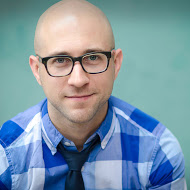
Chad Eschman is an extremely talented actor and playwright from Chicago and LA. He gives us a rare, inside view of his playwriting and creative process and his honest and self reflective experiences at his first writer’s residency.
In your writer’s statement you offer the following provocative description: “I like to write about liars, the ghosts of religion, and the ways we search for and define our families.” Please tell us more about what this means and how it translates into your work.
I think a lot about the identities and roles we have as members of a family. Those roles can be based upon blood ties and shared DNA, sure, but families form in all sorts of other ways, too. Maybe it’s about sharing love, finding connections, feeling safe. Sometimes you find it with your blood relatives, sometimes you find it with others. I think the main thing is to find it. Most of my plays take place in slightly different versions of our world: the government is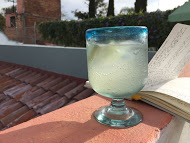 taxing our memories; little girls talk to sad angels; lonely vampires visits missionaries late at night. There’s usually something strange and dangerous going on. I like to think about who we bond with and where our loyalties lie, when things get shaken up like that when there’s a crisis you never would have expected. By moving things just outside of reality, it allows us to step back and apply the stories to our own lives. To think: if war came knocking on our doors, who would we hide with? Or fight for? Or betray?
taxing our memories; little girls talk to sad angels; lonely vampires visits missionaries late at night. There’s usually something strange and dangerous going on. I like to think about who we bond with and where our loyalties lie, when things get shaken up like that when there’s a crisis you never would have expected. By moving things just outside of reality, it allows us to step back and apply the stories to our own lives. To think: if war came knocking on our doors, who would we hide with? Or fight for? Or betray?
Attending 360 Xochi Quetzal was your first writer’s residency. Tell us why it was important for you to attend a residency at this point in your career.
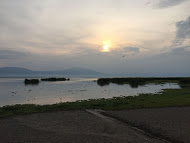 At the time, I was in a state of transition: moving from Chicago to Los Angeles, leaving a steady job to return to the chaos of freelancing, and trying to refocus on acting and writing. While I’d been doing a ton of projects with our theatrical collective, Living Room Playmakers, I hadn’t written my own fulllength piece in almost two years. A good friend, Jessy, came across 360XQ residency and immediately sent it my way. I had the idea for a new play, so the possibility of spending an entire month writing sounded amazing. I was also drawn to 360XQ because there would be artists working in other mediums besides writing, and that appealed to me as an inspirational atmosphere. On top of that, my grandmother’s family is originally from Jalisco, and I’d never been, so a residency in Chapala just felt right. Some artists come to a residency with a particular creative game plan. Others just arrive open to whatever inspires them at the moment.
At the time, I was in a state of transition: moving from Chicago to Los Angeles, leaving a steady job to return to the chaos of freelancing, and trying to refocus on acting and writing. While I’d been doing a ton of projects with our theatrical collective, Living Room Playmakers, I hadn’t written my own fulllength piece in almost two years. A good friend, Jessy, came across 360XQ residency and immediately sent it my way. I had the idea for a new play, so the possibility of spending an entire month writing sounded amazing. I was also drawn to 360XQ because there would be artists working in other mediums besides writing, and that appealed to me as an inspirational atmosphere. On top of that, my grandmother’s family is originally from Jalisco, and I’d never been, so a residency in Chapala just felt right. Some artists come to a residency with a particular creative game plan. Others just arrive open to whatever inspires them at the moment.
How did you approach your residency and how did your time compare towhat you anticipated?
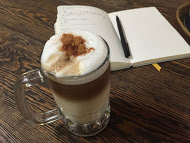 I definitely had a plan. My goal was to go through the entire writing process of a full first draft of this new play. I had the basic idea of my story and knew the major points, but everything else happened at the residency. Week one was spent brainstorming and outlining, as well as getting acquainted with the area, the 360XQ team, and my fellow residents. During weeks two and three I wrote out the play, scene by scene, entirely by hand. As I did, my outline kept changing, which was interesting. The story kind of defied me, but that was okay because it never felt out of control. Having a solid plan kept things level, even as that plan shifted. The final week I typed up and formatted the script, rewriting and editing as I went along. I completed the draft on the night before my last full day in Chapala. That felt great.
I definitely had a plan. My goal was to go through the entire writing process of a full first draft of this new play. I had the basic idea of my story and knew the major points, but everything else happened at the residency. Week one was spent brainstorming and outlining, as well as getting acquainted with the area, the 360XQ team, and my fellow residents. During weeks two and three I wrote out the play, scene by scene, entirely by hand. As I did, my outline kept changing, which was interesting. The story kind of defied me, but that was okay because it never felt out of control. Having a solid plan kept things level, even as that plan shifted. The final week I typed up and formatted the script, rewriting and editing as I went along. I completed the draft on the night before my last full day in Chapala. That felt great.
How did you structure your time during your residency?
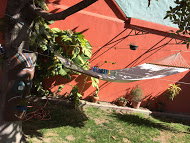 To be honest, I’m terrible at sticking to a consistent schedule. I often started each day with a jog down by the lake, and then I ran errands or dealt with email. It takes me a while (and some strong coffee) to get up to full speed. Afternoons are my favorite time to write, so I planted myself on the roof for a few hours and set a milestone: finish one entire scene, or write nonstop until a timer beeped, or nail down the events of the next act. I also decided to blog every day to keep myself accountable and add structure. It was partly about the writing process, partly about discoveries I made while in residence, and partly about wandering the town.
To be honest, I’m terrible at sticking to a consistent schedule. I often started each day with a jog down by the lake, and then I ran errands or dealt with email. It takes me a while (and some strong coffee) to get up to full speed. Afternoons are my favorite time to write, so I planted myself on the roof for a few hours and set a milestone: finish one entire scene, or write nonstop until a timer beeped, or nail down the events of the next act. I also decided to blog every day to keep myself accountable and add structure. It was partly about the writing process, partly about discoveries I made while in residence, and partly about wandering the town.
What were some of the highlights of the residency for you? What parts were hard?
 There is nothing like setting aside an entire period of time to devote to one writing project. It’s intimidating, but also liberating, and I learned that it is a great way for me to start a new play. The fact that I was in a place I’d never been before, speaking a language I don’t know very well, figuring out local rules and schedules, put me in a slightly uneasy state of mind which I found helpful, even when it was awkward.
There is nothing like setting aside an entire period of time to devote to one writing project. It’s intimidating, but also liberating, and I learned that it is a great way for me to start a new play. The fact that I was in a place I’d never been before, speaking a language I don’t know very well, figuring out local rules and schedules, put me in a slightly uneasy state of mind which I found helpful, even when it was awkward.
You have worked in several collaborative settings. We would love to hear more about this process.
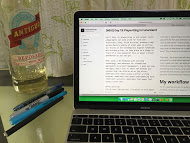 For the past three years I’ve been comanaging Living Room Playmakers, primarily based in Chicago. Now I’m setting up our Los Angeles branch. LRP is a group of playwrights who write and produce plays for unusual spaces, and also throw some pretty good parties. There’s a couple things that make this group unique. Firstly. we write for specific locations: a midcentury furniture shop, an unlicensed concert hall, a tabletop gaming office, just to name a few. We make plays in places that belong to someone else, and are not at all designed for theatre; it feels like people are allowing us to come into their homes. So we explore, and we try to get to know how the place “works.” We look for the hidden stories there that excite us, and then we start to write. Secondly, we write as a team. Sometimes that means we’re all writing short plays that riff on a similar theme. Sometimes that means we’re breaking one big story into smaller moments that one of us takes ownership over. It’s a little different each time, but we’ve developed a process in which we are in sync from day one, sharing ideas and workshopping each other’s pages. It leads to productions that may tell several different stories, but that also have a cohesion and a flow that I find really exciting.
For the past three years I’ve been comanaging Living Room Playmakers, primarily based in Chicago. Now I’m setting up our Los Angeles branch. LRP is a group of playwrights who write and produce plays for unusual spaces, and also throw some pretty good parties. There’s a couple things that make this group unique. Firstly. we write for specific locations: a midcentury furniture shop, an unlicensed concert hall, a tabletop gaming office, just to name a few. We make plays in places that belong to someone else, and are not at all designed for theatre; it feels like people are allowing us to come into their homes. So we explore, and we try to get to know how the place “works.” We look for the hidden stories there that excite us, and then we start to write. Secondly, we write as a team. Sometimes that means we’re all writing short plays that riff on a similar theme. Sometimes that means we’re breaking one big story into smaller moments that one of us takes ownership over. It’s a little different each time, but we’ve developed a process in which we are in sync from day one, sharing ideas and workshopping each other’s pages. It leads to productions that may tell several different stories, but that also have a cohesion and a flow that I find really exciting.
Tell us a little about what you are currently working on and what readings or productions are coming up?
 I recently finished producing the first installment of LRP’s 10minute script readings in Hollywood. The team in Chicago is putting up some pieces on the shore of Lake Michigan, and I’m helping them from afar. We’ve just launched our new website with a complete overhaul of our visual identity. I’m also having some conversations with my colleagues about our first fulls cale production in LA, so we’re snooping around to find the right place for that. I’m preparing to start the fundraising campaign for Never Stop, a short film that I wrote, and which I’m producing and acting in this summer. It’s a piece I’ve been playing with since graduate school, when I became fascinated with William S. Burroughs and his book Naked Lunch. I wrote the original version using overheard conversations, stream ofconsciousness journaling, cutup pages of my own text, and a whole bunch of whiskey. But now, since coming to LA, the project has taken on its own life and gathered a really exciting group of filmmakers. I’m thrilled that we’re making this thing a reality.
I recently finished producing the first installment of LRP’s 10minute script readings in Hollywood. The team in Chicago is putting up some pieces on the shore of Lake Michigan, and I’m helping them from afar. We’ve just launched our new website with a complete overhaul of our visual identity. I’m also having some conversations with my colleagues about our first fulls cale production in LA, so we’re snooping around to find the right place for that. I’m preparing to start the fundraising campaign for Never Stop, a short film that I wrote, and which I’m producing and acting in this summer. It’s a piece I’ve been playing with since graduate school, when I became fascinated with William S. Burroughs and his book Naked Lunch. I wrote the original version using overheard conversations, stream ofconsciousness journaling, cutup pages of my own text, and a whole bunch of whiskey. But now, since coming to LA, the project has taken on its own life and gathered a really exciting group of filmmakers. I’m thrilled that we’re making this thing a reality.
Where can we see and read about more of your work?
I have a new website, which does include the blogging I did at 360XQ, as well as updates on all of my new pursuits.
The new LRP website has info on what we’re doing in both LA and Chicago.
My playwriting is on the New Play Exchange if you’d like to take a look.
I also send out updates on everything via Twitter, which includes my work in theatre, film, and cocktails.
